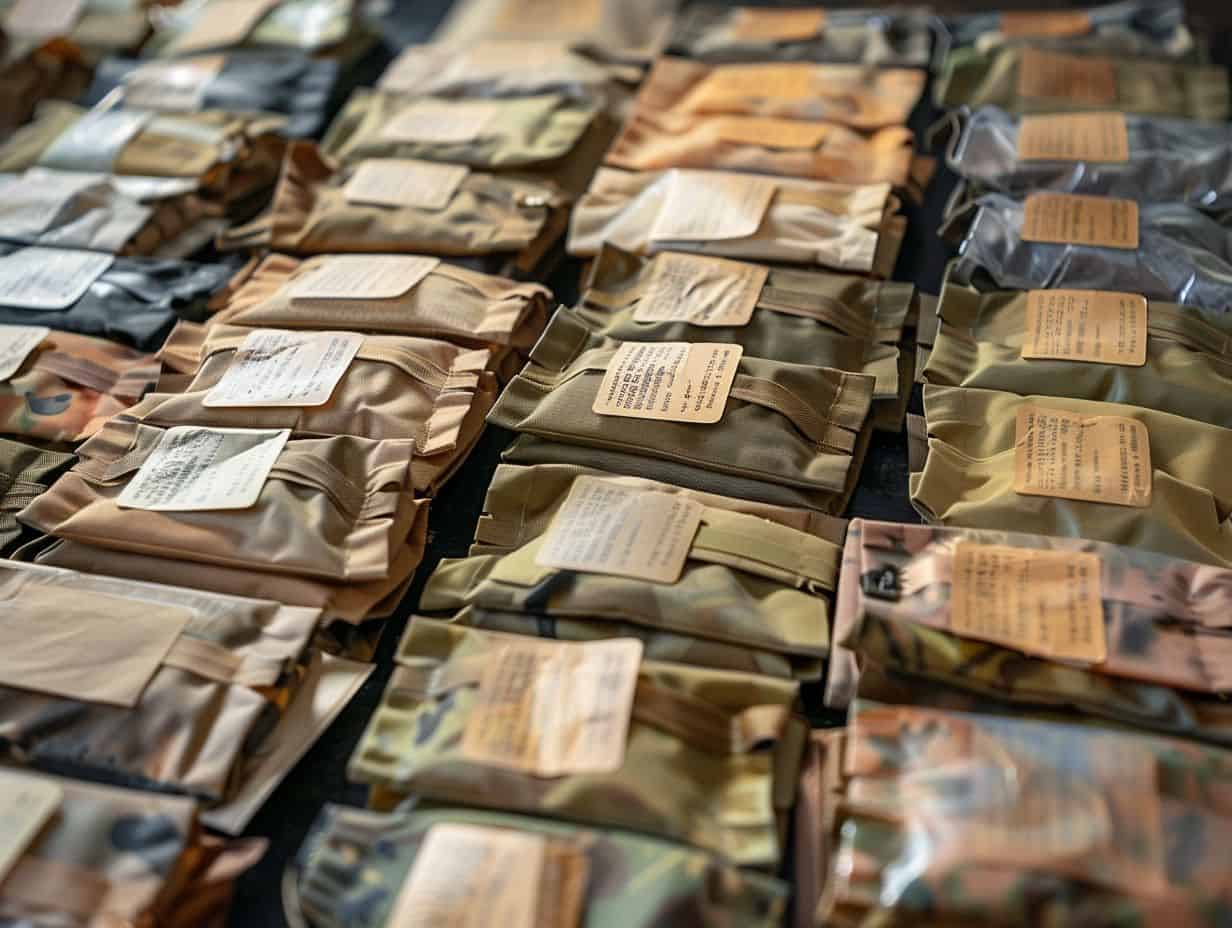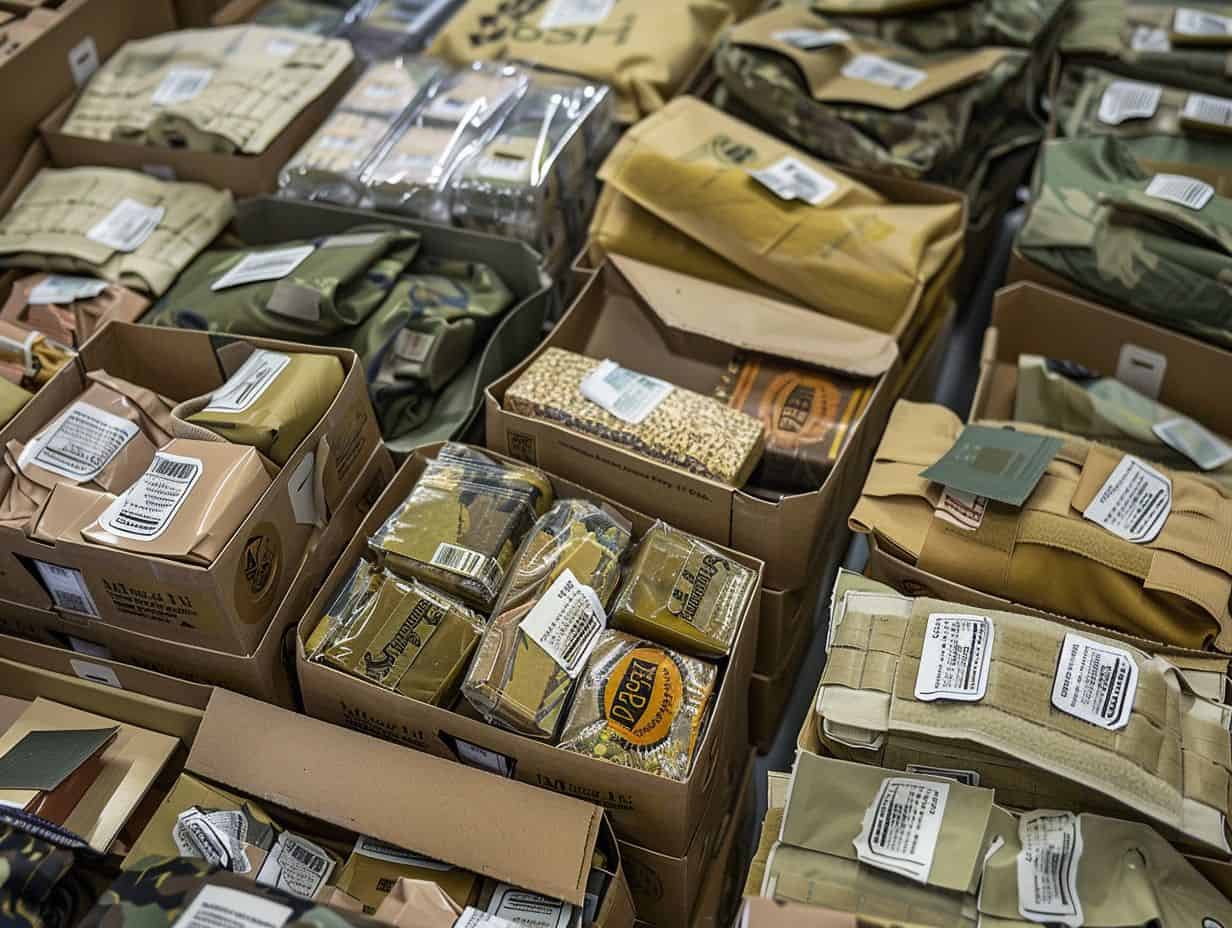Interested in learning about the definition of MREs and their importance in Special Forces operations?
Discover the background of MREs, the specific caloric and nutritional requirements for Special Forces, and how these meals are customized to fulfill the demands of elite military units.
From tailored meal plans for diverse missions to addressing obstacles and advancements in Special Forces nutrition, explore the future of personalized nutrition for optimal performance in the field.
What are MREs?
MREs, short for Meal Ready-to-Eat, are compact meals intended for military personnel to consume while in the field. These meals come in portable containers that are easy to carry and require minimal preparation, making them well-suited for military operations.
The convenience of MREs stems from their ability to provide nourishment on-the-go without the necessity of traditional cooking facilities. Service members can easily open an MRE pouch and enjoy a fully-prepared meal, including a main course, side dishes, snacks, and desserts. The portability of these meals enables troops to maintain their energy levels during tactical operations, ensuring they can carry out their missions effectively. The extended shelf life of MREs makes them dependable sources of sustenance in diverse operational conditions.
History of MREs
The history of MREs can be traced back to the early 1980s when they were introduced by the military as an innovative replacement for canned food. The primary goal was to enhance the nutritional quality of meals for soldiers by providing shelf-stable and long-lasting options that could withstand challenging environments.
Over time, MREs have undergone significant changes in terms of variety and nutritional content. Originally simple meals in pouches, they have evolved into more complex options focused on providing balanced nutrition. This evolution has allowed for a wider range of flavors, textures, and dietary considerations to meet the diverse needs of military personnel in the field.
The development of MREs has not only improved convenience but also plays a crucial role in ensuring troops have access to nourishing meals regardless of their location or circumstances.
Why are MREs important for Special Forces?
MREs are important for meeting the nutritional needs of Special Forces members during their demanding tactical operations. Special Forces units rely on MREs to ensure they receive the necessary calories and essential nutrients for optimal performance in combat situations.
The design of MREs is customized to meet the unique needs of Special Forces personnel, considering the physical demands and unpredictable nature of their missions. By providing a convenient and efficient source of nutrition, MREs help operatives stay focused and energized, even in challenging environments.
The portability and long shelf life of MREs also make them practical for extended missions or situations where access to traditional food sources is limited. These aspects highlight the important role that MREs play in supporting the physical and mental well-being of Special Forces members, ultimately improving their overall operational efficiency.
Calorie and Nutrient Requirements for Special Forces
Special Forces personnel have specific caloric requirements due to the high-intensity nature of their missions. These operatives need meals rich in high-protein content to support muscle recovery and endurance, optimizing their performance in challenging environments.
Protein is essential for muscle repair and growth, providing the building blocks necessary for the body to recover from demanding physical activities. High-protein diets are crucial for Special Forces operators to meet their energy needs and sustain their strength during intense training sessions and field operations. By prioritizing protein intake, these individuals can enhance their overall fitness levels and combat readiness, allowing them to perform at peak levels consistently.
Importance of Portability and Shelf Life for Special Forces Operations
In dynamic operations, the portability and extended shelf life of MREs are crucial for Special Forces. These field rations provide essential nutrition that ensures combat readiness and sustained performance in challenging environments where access to traditional food sources may be limited.
The ability to have compact, easily transportable meals plays a significant role in maintaining peak performance during extended field operations. Portable nutrition is vital for Special Forces as it allows them to stay energized and focused without the constraints of conventional cooking facilities. This aspect of field nutrition enables operatives to remain agile and responsive in diverse combat scenarios, ensuring operational efficiency and effectiveness. When every second counts in a mission, having accessible and long-lasting food options can be a game-changer for rapid deployment and sustained performance.
How are MREs Tailored for Special Forces?
MREs for Special Forces are tailored meticulously to meet the unique dietary requirements of each mission. Customized menus consider the specific nutritional needs, dietary restrictions, and allergies of operatives to ensure their optimal performance and mission success. By providing a variety of options, from gluten-free to vegetarian, these customized MREs enable Special Forces operatives to concentrate on their essential tasks without concerns about inadequate nutrition.
Recognizing that individual dietary needs can vary significantly, Special Forces units prioritize ensuring that each member has access to suitable meals that nourish their bodies for peak physical and mental performance during missions. This attention to detail in meal planning not only enhances the well-being of the operatives but also plays a crucial role in maintaining operational effectiveness and overall success in challenging environments.
Customized Meal Plans for Different Missions

Special Forces nutritionists develop customized meal plans to meet the nutritional requirements of various missions. These meal plans prioritize nutrient-dense foods to meet combat nutrition needs and undergo continuous refinement through thorough menu development processes.
The creation of these meal plans involves analyzing the unique requirements of each mission, taking into account factors like duration, intensity, and environmental circumstances. By understanding the physical demands faced by Special Forces operatives during missions, nutritionists can tailor the meal plans to supply the necessary energy, protein, carbohydrates, and micronutrients for optimal performance.
Menu development strategies may involve rotating menu items to prevent taste fatigue, incorporating local and seasonal ingredients for diversity, and ensuring meals are easily prepared in field conditions. This detailed approach ensures that every meal provided contributes to the overall combat readiness of the forces.
Considerations for Dietary Restrictions and Allergies
Special Forces nutritionists carefully analyze dietary restrictions and allergies to create MREs that meet individual needs. By conducting thorough nutritional assessments and following dietary guidelines, these customized meal options accommodate a variety of dietary requirements to enhance operational success.
Considering factors like food allergies, cultural preferences, religious restrictions, and personal dietary choices, Special Forces nutritionists can design menus that meet the specific needs of each operator. This level of attention ensures that every team member receives the essential nutrients and energy required to excel during intense missions and training sessions.
The meticulous nutritional analysis process also aids in identifying any potential deficiencies and adjusting meal plans as needed to optimize performance and aid in recovery.
Maximizing Nutrient Density in Limited Space
Special Forces MREs efficiently utilize limited space to maximize nutrient density through high-calorie meals that strike a nutritional balance critical for combat survival. These compact meal options are carefully crafted to provide the necessary sustenance for prolonged operations.
By emphasizing nutrient density and high-calorie content, these MREs ensure that soldiers receive vital nutrients needed to sustain energy levels and mental acuity during demanding missions. The inclusion of essential vitamins, minerals, and proteins in these meals not only aids in physical performance but also supports overall health and well-being. In the high-stress environments of combat zones, the efficiency in meal design becomes a critical factor in maintaining the resilience and readiness of Special Forces operatives.
Challenges and Innovations in Special Forces Nutrition
Special Forces nutrition encounters numerous challenges, including combat stress and the need to uphold performance metrics in harsh environments. Ongoing developments in food science are transforming how customized nutrition aids in supporting the operational resilience and health of elite military units.
These challenges arise from the distinct demands and physical strain associated with Special Forces operations, where soldiers must function in extreme conditions for prolonged periods. Combat stress can pose significant obstacles to maintaining optimal performance, as quick decision-making and physical stamina are crucial in high-pressure scenarios. Factors such as restricted access to food supplies, irregular meal schedules, and the requirement for compact, lightweight rations further complicate nutrition planning.
Through advancements in food science, specialized nutrient-rich meals are being created to address the specific dietary needs of Special Forces operatives, enabling enhanced energy levels, cognitive function, and overall health during strenuous missions.
Addressing Burnout and Monotony in MREs
To address burnout and monotony, Special Forces nutritionists prioritize menu rotation in MREs to boost performance and morale. This practice is particularly important for expeditionary forces in challenging environments, where diverse and appealing meal choices can boost morale and enhance cognitive function.
By offering a variety of menu options, including fresh produce, proteins, and carbohydrates, Special Forces can ensure that their personnel receive the necessary nutrients to maintain their physical and mental well-being. Menu rotation helps prevent taste fatigue, a common issue when individuals consume the same meals repeatedly, which can lead to reduced appetite and dissatisfaction. The element of surprise and novelty in meal choices can also provide a psychological lift, creating a sense of excitement and anticipation during mealtimes.
Exploring Alternative Nutrient Sources
Special Forces nutrition explores innovative alternative nutrient sources, such as nutritional supplements and hydration solutions, aimed at optimizing performance. These advancements in combat medicine and nutrition are designed to support the physical and cognitive demands placed on elite military units during missions.
Incorporating nutritional supplements allows Special Forces to enhance key nutrients that may be lacking in their diets due to the intense nature of their training and missions. Hydration solutions are crucial for maintaining optimal performance levels, especially in challenging environments where staying hydrated is essential for peak physical and cognitive functionality. The use of these advanced nutritional strategies not only supports combat medicine by promoting faster recovery and reducing the risk of injuries but also contributes to overall performance optimization for Special Forces operatives.
Integrating Technology for Better Nutrition Tracking

Technology integration has improved Special Forces nutrition by implementing efficient nutrition tracking tools that enhance operational efficiency. The use of cutting-edge food technology aids in precise nutritional planning and adequacy to support mission success.
The deployment of advanced tracking devices enables Special Forces personnel to track their dietary intake in real-time, offering valuable insights into energy requirements and overall nutritional balance. This data-driven approach allows commanders to make informed decisions regarding meal planning to optimize performance and sustain energy levels during high-intensity operations.
Food technology innovations are essential in creating portable and nutrient-dense meal options tailored to meet the specific needs of Special Forces operatives, further enhancing their operational effectiveness in challenging environments.
The Future of Special Forces Nutrition
As advancements in nutritional support continue to progress, developments in Special Forces nutrition are leading to sustainable and customized meal solutions. These innovations are designed to improve the long-term health and performance of elite military units, ensuring resilience and success in various mission scenarios.
By incorporating the latest research and technology, Special Forces are transforming their dietary strategies to enhance physical and cognitive abilities. The future direction of Special Forces nutrition is shifting towards more personalized meal plans, utilizing data analytics and biohacking techniques. This tailored approach not only enhances performance but also reduces waste and environmental impact, aligning with sustainability principles. As these developments shape the landscape of nutritional support, Special Forces are moving towards achieving higher levels of efficiency and effectiveness in their operations.
Advancements in MRE Technology
The future of MRE technology brings advancements in menu variety and food packaging solutions for Special Operations Forces. These developments are aimed at improving the nutritional quality, portability, and appeal of MREs, ensuring that operatives have a diverse selection of nutritionally balanced meal options during missions.
The expanded menu variety will include a wider range of flavors and dietary choices to accommodate the diverse preferences and nutritional needs of soldiers in the field. Improvements in food packaging technology will concentrate on enhancing shelf stability, durability, and ease of consumption to keep the meals fresh and ready-to-eat in various operational environments.
These advancements represent a comprehensive approach to enhancing the overall quality of MREs, which in turn can enhance the physical and mental performance of military personnel in challenging situations.
Personalized Nutrition for Special Forces Operators
The future of Special Forces nutrition involves personalized dietary approaches that address individual physiological needs and muscle recovery requirements. Tailored diets based on the nutritional physiology of operators are designed to enhance performance and resilience in challenging combat environments.
Customizing food choices to support the unique demands of Special Forces missions is essential for improving overall operational effectiveness. Taking into account the balance between macronutrients and micronutrients, individual tolerances, and preferences allows for a targeted approach that facilitates quicker muscle recovery and sustained energy levels. Emphasizing quality protein sources, healthy fats, and nutrient-dense carbohydrates, these specialized diets not only support performance but also help combat fatigue and enhance mental sharpness during intense operations.
Collaboration with Nutrition Experts for Optimal Performance
Collaboration with nutrition experts plays a crucial role in ensuring the operational readiness and combat stamina of Special Forces personnel. By partnering with specialists in combat nutrition and physiological support, elite military units can enhance their combat survival capabilities and sustain peak performance in challenging environments.
These collaborations are essential for optimizing the physical and mental resilience of Special Forces operatives, equipping them with the nutritional knowledge and dietary strategies necessary for enduring long, demanding missions. Nutrition experts play a crucial role in developing personalized meal plans that fuel the high-energy demands of intense combat situations and facilitate quick recovery. Their expertise ensures that operational readiness remains at its peak, enhancing overall performance and increasing the chances of mission success.
Frequently Asked Questions
1. What is Special Forces nutrition and why is it important for elite military units?

Special Forces nutrition refers to the specific dietary needs and considerations for members of elite military units, such as Navy SEALs, Army Rangers, and Delta Force. These individuals have rigorous physical demands and require a specialized diet to optimize performance and maintain peak physical condition.
2. How are MREs tailored for elite military units?
MREs (Meals, Ready-to-Eat) are the standard ration for military personnel, but they are not one-size-fits-all. Special Forces nutrition experts work with military chefs to tailor MREs to meet the specific dietary needs and preferences of elite units. This includes incorporating more protein and healthy fats, as well as reducing sugar and processed ingredients.
3. What are the benefits of tailoring MREs for elite military units?
By tailoring MREs for elite military units, soldiers will have access to meals that are specifically designed to support their physical performance and overall health. This can result in improved energy levels, enhanced recovery, and better mental focus and clarity on the battlefield.
4. How does Special Forces nutrition differ from standard military nutrition?
Standard military nutrition focuses on providing a balanced diet for all soldiers, while Special Forces nutrition takes into account the unique needs and demands of elite units. This may include higher calorie and protein requirements, as well as specific micronutrient needs to support physical performance and recovery.
5. Are MREs the only source of nutrition for Special Forces soldiers?
No, MREs are not the only source of nutrition for Special Forces soldiers. These individuals may also have access to other sources of food, including fresh fruits and vegetables, during shorter missions. However, MREs are an important part of their diet and must meet their specific nutritional needs.
6. How often are MREs updated and modified for Special Forces nutrition?
MREs are constantly being updated and modified to better meet the nutritional needs of Special Forces soldiers. Nutrition experts and military chefs work together to analyze the latest research and feedback from soldiers to make necessary changes and improvements to the meals. This ensures that soldiers are receiving the best possible nutrition to support their physical performance and overall health.


